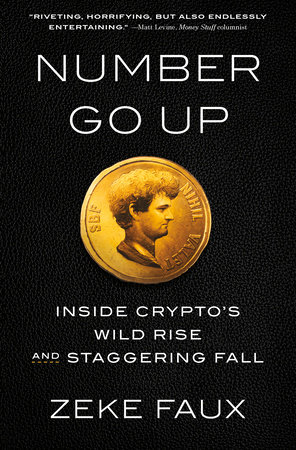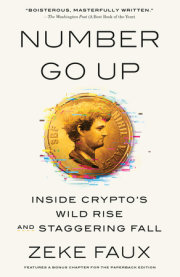Prologue Nassau, Bahamas
February 17, 2022
Total Value of All Cryptocurrencies: $2 Trillion
(Yes, Trillion with a “T”)
“I’m not going to lie,” Sam Bankman-Fried told me.
This was a lie.
We were in his office in the Bahamas, and I had just pulled up my chair to his desk and turned on my tape recorder. I had flown in on assignment from Bloomberg, where I worked as an investigative reporter, to see the man at the center of the cryptocurrency frenzy that was sweeping the globe.
Bankman-Fried stared ahead at his six monitors and scrolled through emails as he told me that I could always count on him to give his honest opinions about crypto. Forbes had recently declared him the world’s richest person under thirty, but he looked like a student who’d been shaken awake after an all-nighter in the library. He was schlubby and shoeless, in blue shorts and a gray T-shirt advertising his cryptocurrency exchange, FTX. His wild curly hair was so matted down by the headphones he’d been wearing that he resembled a half-sheared sheep. On his desk I saw an open packet of chickpea korma—yesterday’s lunch.
My plan was to write a profile of crypto’s boy genius, the man who, at twenty-nine, seemed to have the future of money figured out. His rise had been so meteoric that it seemed plausible when he said FTX would one day take over all of Wall Street. He was worth at least $20 billion, but he claimed he’d only gotten rich so that he could give it all away. He drove a Toyota Corolla and liked to sleep at the office on a beanbag chair, which I could see next to his desk.
It was an irresistible story. The problem was that it was not true. While the media, politicians, venture capitalists, and investment bankers lauded him as a benevolent prodigy—a Warren Buffett or J. P. Morgan for the digital age—he was secretly embezzling billions of dollars of his customers’ money and blowing it on bad trades, celebrity endorsements, and an island realestate shopping spree to rival any drug kingpin’s.
I’d like to tell you that I was the person who exposed it all, the heroic investigator who saw through one of history’s greatest frauds. But I got tricked like everyone else. I was sitting next to the biggest con man since Bernie Madoff, with a clear view of his emails, internal chats, and trading records, and I had no idea what he was up to.
“You can use me as a resource for information,” Bankman-Fried said, tapping his crew-sock-clad feet aggressively. “That’s one of the biggest things I want to convey.”
“That makes sense,” I said to him, nodding amiably.
I did have my suspicions. From the day I started digging into the crypto world, I had seen nothing but red flags. Why were all these companies based in infamous offshore regulatory havens? What was up with all these random virtual coins that were supposedly worth tens of billions of dollars? Was that, just maybe, a precarious foundation for the future of finance? Were they all scams?
But by the time I visited Bankman-Fried’s island hideaway, the logic of the financial world had broken down. Hardly anyone knew what cryptocurrencies were for. Even supposed experts couldn’t explain them. It was unclear why many of the coins would be worth anything at all. But from 2020 to early 2022, the prices of Bitcoin and hundreds of other lesser coins—with ridiculous names like Dogecoin, Solana, Polkadot, and Smooth Love Potion—were going up and up. While I was in the Bahamas, people traded more than $500 billion worth of them, and the market value of all coins combined topped $2 trillion.
Crypto boosters claimed they were in the vanguard of a revolution that would democratize finance and lead to generational wealth for those who believed. The roar of the rising prices drowned out the skeptics. Incomprehensible jargon became inescapable. Blockchain.
DeFi. Web3. The metaverse. What these terms meant was beside the point. Newspapers, TV, and social media bombarded potential investors with stories of regular people who invested in them and got rich quick.
Crypto seemed like a giant slot machine that had been rigged to pay out almost every time. Hundreds of millions of people around the world gave in to the temptation to pull the lever. Everybody knew somebody who’d hit it big. And the more people who bought in, the higher prices rose.
None of this led to any sort of mass movement to actually use crypto in the real world. Nobody tossed their credit cards, closed their bank accounts, and abandoned the dollar or the euro in favor of, say, Cardano coins. But the hucksters, zealots, opportunists, and outright scammers who created the boom got unbelievably, unimaginably, impossibly rich.
Bankman-Fried told me that as many as five of his colleagues at FTX were billionaires. And that was just a single crypto company. Many unprofitable start-ups with questionably legal business plans were valued in the billions. Changpeng Zhao, who founded another crypto exchange called Binance, made a fortune estimated at $96 billion. The numbers got so large that even the most delusional crypto fantasies started to sound reasonable. It seemed like nothing could stop crypto’s manic rise.
Until, of course, the house of cards collapsed. Starting in the summer of 2022, many companies in crypto were revealed to be frauds. The bubble popped. About $2 trillion of market value was erased. Billionaires went bankrupt. Millions of ordinary people lost their savings. The financial authorities who’d allowed scammers to run rampant finally decided it was time to lay down the law. Bankman-Fried and many of his associates were arrested. Crypto didn’t disappear entirely, but the fever had broken.
This is the story of the greatest financial mania the world has ever seen. It started as an investigation of a coin called Tether that served as a kind of bank for the industry. But it morphed into a two-year journey that would stretch from Manhattan to Miami, to Switzerland, Italy, the Bahamas, El Salvador, and the Philippines. It is based on hundreds of interviews with people at every level of crypto, from gamblers to coders to promoters to billionaires. I visited their yachts and parties at the pinnacle of the frenzy and their hideouts as the authorities were closing in.
From the beginning, I thought that crypto was pretty dumb. And it turned out to be even dumber than I imagined. Never before has so much wealth been generated with such flimsy schemes. But what shocked me was not the vapidity of the crypto bros. It was how their heedlessness had devastating consequences for people across the world. By the end, I’d find myself in Cambodia, investigating how crypto fueled a vast human-trafficking scheme run by Chinese gangsters.
I pitched this book to my publisher in November 2021, near the mania’s peak, on the premise that crypto would soon collapse, and I’d chronicle the catastrophic fallout. Three months later, I was sitting with Bankman-Fried at his Bahamas office and looking at the computer screens behind his fuzzy head. I was oblivious to the giant fraud happening right in front of me. In fact, by then, I was starting to worry that I would never figure out the secret behind the crypto boom.
I was still fairly certain that huge swaths of crypto were essentially a pyramid scheme, but the bubble hadn’t popped. The industry was doing great. It seemed quite possible that the craze could continue far beyond my deadline. Or maybe crypto would gain so many followers that it would become unstoppable. I had no idea what the ending of the book was going to be.
After we’d spent a few hours together, I decided to ask Bankman-Fried for advice. This was half interview tactic, half genuine cry for help. I didn’t expect him to tell me his whole industry was really a fraud. But I wanted to see if he might be willing to point me in the right direction. So I laid out my whole narrative dilemma. I told him my theory: that the coin called Tether, the supposedly safe crypto-bank that served as the backbone for a whole lot of other cryptocurrencies, could prove to be fraudulent, and how that could bring down the whole industry.
Bankman-Fried said that I was wrong. Crypto wasn’t a scam, and neither was Tether. But he wasn’t offended by my question. He said he totally understood my problem. Then he did something that didn’t strike me as strange at the time. But knowing what I know now, I can’t help but wonder if he was trying to make some kind of winking confession.
Bankman-Fried cut me off, nodding, as I tried to explain more. His tone turned chipper. He said: “It’s like the narrative would be way sexier if it was like, ‘Holy shit, this is the world’s biggest Ponzi scheme,’ right?”
Right.
Copyright © 2023 by Zeke Faux. All rights reserved. No part of this excerpt may be reproduced or reprinted without permission in writing from the publisher.








